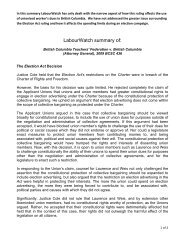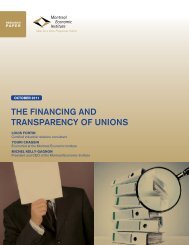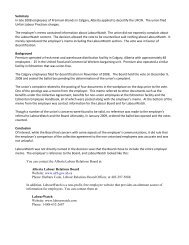to view the Dec 2008 Ontario Court of Appeal ... - LabourWatch
to view the Dec 2008 Ontario Court of Appeal ... - LabourWatch
to view the Dec 2008 Ontario Court of Appeal ... - LabourWatch
You also want an ePaper? Increase the reach of your titles
YUMPU automatically turns print PDFs into web optimized ePapers that Google loves.
no relation whatsoever <strong>to</strong> actual losses suffered by <strong>the</strong> Union as a result <strong>of</strong> members crossing <strong>the</strong> picket line.<br />
The financial penalty <strong>the</strong>refore fell in<strong>to</strong> <strong>the</strong> category <strong>of</strong> penalties that will not be enforced by <strong>the</strong> courts.<br />
Third, <strong>the</strong> Union argued that <strong>the</strong> financial penalties were not unconscionable in <strong>the</strong> labour relations<br />
circumstances and <strong>the</strong>refore should be enforced in <strong>the</strong> courts. Justice Smith disagreed, finding that <strong>the</strong> financial<br />
penalties were "extremely onerous" and based on speculative assumptions. Significantly, he rejected <strong>the</strong> idea<br />
that a financial penalty for picket line crossing could be based on <strong>the</strong> supposed financial benefit <strong>of</strong> such crossing<br />
<strong>to</strong> <strong>the</strong> employer. The Union also asserted that <strong>the</strong> financial penalties were justifiable <strong>to</strong> deter "free riders" who<br />
would benefit from strike activity while continuing <strong>to</strong> report <strong>to</strong> work. In response, Justice Smith observed that<br />
trade unions should use strategies o<strong>the</strong>r than onerous financial penalties <strong>to</strong> encourage respect for picket lines<br />
(e.g. persuasive information campaigns and better strike pay).<br />
Fourth, Justice Smith rejected <strong>the</strong> submission that <strong>the</strong> Public Service Labour Relations Act (PSLRA) authorized<br />
<strong>the</strong> imposition <strong>of</strong> financial penalties for crossing a picket line. The relevant provisions <strong>of</strong> <strong>the</strong> PSLRA are very<br />
similar <strong>to</strong> provisions <strong>of</strong> <strong>the</strong> Canada Labour Code. At best, <strong>the</strong>se PSLRA provisions refrain from making it an<br />
unfair labour practice for unions <strong>to</strong> levy financial penalties against <strong>the</strong>ir members. However, <strong>the</strong>re would have<br />
<strong>to</strong> be a clear statu<strong>to</strong>ry provision authorizing such penalties before <strong>the</strong> courts would enforce <strong>the</strong>m.<br />
The <strong>Dec</strong>ember <strong>2008</strong> <strong>Appeal</strong> <strong>Dec</strong>ision<br />
In a 2 <strong>to</strong> 1 decision, <strong>the</strong> majority <strong>of</strong> <strong>the</strong> <strong>Court</strong> <strong>of</strong> <strong>Appeal</strong> agreed with <strong>the</strong> application judge and held that <strong>the</strong><br />
provision in UTE's constitution authorizing <strong>the</strong> imposition <strong>of</strong> fines is unconscionable and <strong>the</strong>refore<br />
unenforceable. In applying <strong>the</strong> unconscionability test, <strong>the</strong> majority found that <strong>the</strong>re was an inequality in<br />
bargaining power between <strong>the</strong> parties and that, you as <strong>the</strong> respondents did not have much choice in agreeing <strong>to</strong><br />
<strong>the</strong> inclusion <strong>of</strong> such penalty provisions in <strong>the</strong>ir collective bargaining agreement. Moreover, <strong>the</strong> majority found<br />
that <strong>the</strong> penalties imposed were excessive. While <strong>the</strong> court recognized that union solidarity is a fundamental<br />
principle <strong>of</strong> <strong>the</strong> union movement and <strong>the</strong> collective bargaining process, <strong>the</strong> court found that <strong>the</strong> means adopted<br />
<strong>to</strong> achieve such solidarity were "very unfair". As such, <strong>the</strong> majority <strong>of</strong> <strong>the</strong> court found no basis <strong>to</strong> interfere with<br />
<strong>the</strong> decision <strong>of</strong> <strong>the</strong> application judge. As agreed by <strong>the</strong> parties at <strong>the</strong> conclusion <strong>of</strong> <strong>the</strong> oral arguments, <strong>the</strong> court<br />
awarded costs in <strong>the</strong> amount <strong>of</strong> $3,000 in our favour.<br />
In a dissenting decision, Juriansz J.A. found that <strong>the</strong> fine was not unconscionable and that <strong>the</strong> common law<br />
rules that penalties are per se unenforceable does not apply <strong>to</strong> <strong>the</strong> disciplinary provisions <strong>of</strong> a union constitution.<br />
Justice Juriansz found that (i) <strong>the</strong>re was no inequality <strong>of</strong> bargaining power; (ii) <strong>the</strong> amount <strong>of</strong> <strong>the</strong> fine was not<br />
unfair when considered in light <strong>of</strong> <strong>the</strong> actual damage suffered by <strong>the</strong> union; and (iii) <strong>the</strong> disciplinary provision is<br />
not inherently unenforceable as a penalty. As such, Justice Juriansz would allow <strong>the</strong> appeal.<br />
2 <strong>of</strong> 2







